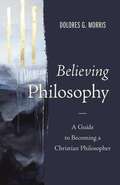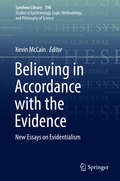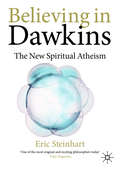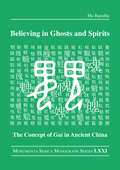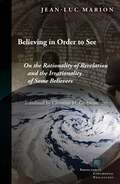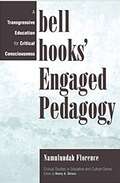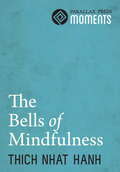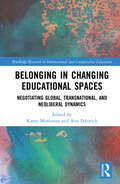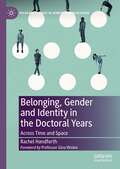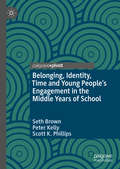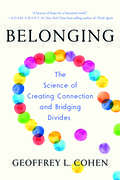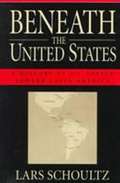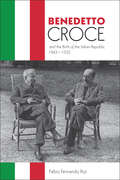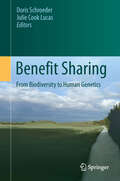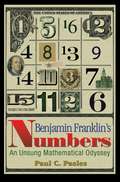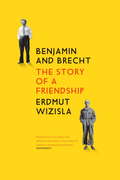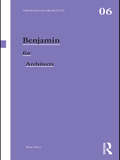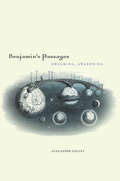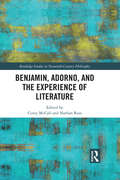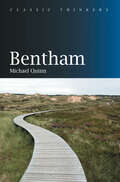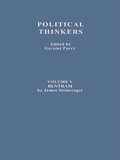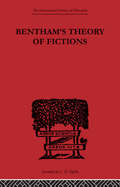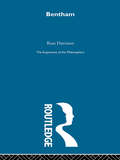- Table View
- List View
Believing Philosophy: A Guide to Becoming a Christian Philosopher
by Dolores G. MorrisBelieving Philosophy introduces Christians to philosophy and the tools it provides believers, helping them understand, articulate, and defend their faith in an age of unbelief.Philosophy has been a part of Christianity since its earliest days, and theistic philosophy predates Christianity by thousands of years. But Christians today often don't realize or are skeptical of all that philosophy can offer them. In Part 1, author Dolores G. Morris explains why Christians should read and study philosophy. She begins with a historical overview of Christian philosophy from the church fathers to contemporary philosophers and then introduces the basic resources of philosophical reasoning: the role and aim of reason, distinctions between truth and reason and provability, and learning to read like a philosopher. These chapters address three foundational questions:What is philosophy?Why should a Christian study philosophy?How should a Christian study philosophy?In Part 2, Morris introduces students to philosophical arguments and questions relevant to Christians. She presents arguments by three key branches of philosophy: metaphysics, epistemology, and practical philosophy. Building on concepts introduced in Part 1, she explains what philosophical arguments are and how they ought to be evaluated from a philosophical and Christian perspective. The following chapters examine specific questions most pressing for Christians today:The problem of evilRationality and faithFree willSkeptical theismThe moral argument for the existence of GodReformed epistemologyEach chapter introduces the problem, explains Christian responses, discusses the strengths and weaknesses of each response, and leaves the final verdict to the reader. Finally, each chapter concludes with a list of recommended further readings.
Believing in Accordance with the Evidence: New Essays on Evidentialism (Synthese Library #398)
by Kevin McCainThis volume explores evidentialism, a major theory of epistemic justification. It contains more than 20 papers that examine its nuances, its challenges, as well as its future directions. Written by leading and up-and-coming epistemologists, the papers cover a wide array of topics related to evidentialism. The contributors present both sides of the theory: some are advocates of evidentialism, while others are critics. This provides readers with a comprehensive, and cutting-edge, understanding of this epistemic theory. Overall, the book is organized into six parts: The Nature of Evidence, Understanding Evidentialism, Problems for Evidentialism, Evidentialism and Social Epistemology, New Directions for Evidentialism, and Explanationist Evidentialism. Readers will find insightful discussion on such issues as the ontology of evidence, phenomenal dogmatism, how experiences yield evidence, the new evil demon problem, probability, norms of credibility, intellectual virtues, wisdom, epistemic justification, and more. This title provides authoritative coverage of evidentialism, from the latest developments to the most recent philosophical criticisms. It will appeal to researchers and graduate students searching for more information on this prominent epistemological theory.
Believing in Dawkins: The New Spiritual Atheism
by Eric SteinhartDawkin's militant atheism is well known; his profound faith less well known In this book, atheist philosopher Eric Steinhart explores the spiritual dimensions of Richard Dawkins’ books, which are shown to encompass:· the meaning and purpose of life· an appreciation of Platonic beauty and truth· a deep belief in the rationality of the universe· an aversion to both scientism and nihilism As an atheist, Dawkins strives to develop a scientific alternative to theism, and while he declares that science is not a religion, he also proclaims it to be a spiritual enterprise. His books are filled with fragmentary sketches of this ‘spiritual atheism’, resembling a great unfinished cathedral. This book systematises and completes Dawkins’ arguments and reveals their deep roots in Stoicism and Platonism. Expanding on Dawkins’ ideas, Steinhart shows how atheists can develop powerful ethical principles, compelling systems of symbols and images, and meaningful personal and social practices. Believing in Dawkins is a rigorous and potent entreaty for the use of science and reason to support spiritually rich and optimistic ways of thinking and living.
Believing in Ghosts and Spirits: The Concept of Gui in Ancient China (Monumenta Serica Monograph Series)
by Hu BaozhuThe present book by Hu Baozhu explores the subject of ghosts and spirits and attempts to map the religious landscape of ancient China. The main focus of attention is the character gui 鬼, an essential key to the understanding of spiritual beings. The author analyses the character gui in various materials – lexicons and dictionaries, excavated manuscripts and inscriptions, and received classical texts. Gui is examined from the perspective of its linguistic root, literary interpretation, ritual practices, sociopolitical implication, and cosmological thinking. In the gradual process of coming to know the otherworld in terms of ghosts and spirits, Chinese people in ancient times attempted to identify and classify these spiritual entities. In their philosophical thinking, they connected the subject of gui with the movement of the universe. Thus the belief in ghosts and spirits in ancient China appeared to be a moral standard for all, not only providing a room for individual religiosity but also implementing the purpose of family-oriented social order, the legitimization of political operations, and the understanding of the way of Heaven and Earth.
Believing in Order to See: On the Rationality of Revelation and the Irrationality of Some Believers (Perspectives in Continental Philosophy)
by Jean-Luc MarionFaith and reason, especially in Roman Catholic thought, are less contradictory today than ever. But does the supposed opposition even make sense to begin with? One can lose faith, but surely not because one gains in reason. Some, in fact, lose faith when reason is not able to make sense of the experiences of our lives. We very quickly realize that reason does not understand everything. Immense areas remain incomprehensible and irrational, which we abandon to belief and opinion.Soon we definitively renounce thinking what that has been excluded from the realm of the thinkable. Ideological nightmares arise from this slumber of reason. Thus, the separation between faith and reason, too quickly taken as self-evident and even natural, is born from a lack of rationality, an easy capitulatin of reason before what is supposedly unthinkable. Rather than lose faith through excessive rationality, we often lose rationality because faith is too quickly excluded from the realm that it claims to open, that of revelation. We lose reason by losing faith.Examining such topics as the role of the intellectual in the church, the rationality of faith, the infinite worth and incomprehensibility of the human, the phenomenality of the sacraments, and the phenomenological nature of miracles and of revelation more broadly, this book spans the range of Marion’s thought on Christianity. Throughout he stresses that faith has its own rationality, structured according to the logic of the gift that calls forth a response of love and devotion through kenotic abandon.
Bell Hooks' Engaged Pedagogy: A Transgressive Education for Critical Consciousness (Critical Studies in Education and Culture)
by Namulundah FlorenceThis work lucidates bell hooks' social and educational theory, with emphasis on her 1994 book, Teaching to Transgress: Education as the Practice of Freedom. Florence deals with the issues of marginality and cultural alienation that are so prevalent among certain groups within the American society and presents strategies to help develop critical consciousness and affirmation of formerly subordinated cultural traits and characteristics. <p><p>Her study resonates with current themes raised by critical, feminist and multicultural scholars showing how marginalized groups may be guilty of reinforcing their own status through complicity with the dominant culture's world view, and how education can empower them to demand a more egalitarian society and one that recognizes cultural plurality.
Bells of Mindfulness
by Thich Nhat HanhThe Bells of Mindfulness is part of the Parallax Press Moments series of short ebooks. Thich Nhat Hanh presents a dramatic vision of the future of our planet, a call for environmental awareness, and Buddhist teachings on interconnectedness. Ultimately, Nhat Hanh believes that engaging with the world is the key to our individual and collective survival. Selected from his best-selling title The World We Have.
Belonging in Changing Educational Spaces: Negotiating Global, Transnational, and Neoliberal Dynamics (Routledge Research in International and Comparative Education)
by Karen Monkman Ann FrkovichThis book explores the impacts on personal and professional, local and global forms of belonging in educational spaces amidst rapid changes shaped by globalization. Encouraging readers to consider the idea of belonging as an educational goal as much as a guiding educational strategy, this text forms a unique contribution to the field. Drawing on empirical and theoretical analyses, chapters illustrate how educational experience informs a sense of belonging, which is increasingly juxtaposed against a variety of global dynamics including neoliberalism, transnationalism, and global policy and practice discourses. Addressing phenomena such as refugee education, large-scale international assessments, and study abroad, the volume’s focus on ten countries including Japan, Sierra Leone, and the US demonstrates the complexities of globalization and illuminates possibilities for supporting new constructions of belonging in rapidly globalizing educational spaces. This text will benefit researchers, academics, and educators with an interest in international and comparative education, multicultural education, and educational policy more broadly. Those interested in the sociology of education and cultural studies within education will also benefit from this volume.
Belonging, Gender and Identity in the Doctoral Years: Across Time and Space (Palgrave Studies in Gender and Education)
by Rachel HandforthThis book uses belonging as a lens through which to understand women students’ experiences of studying for a doctorate, exploring the impact of academic cultures on career aspirations. Drawing on discourses of neoliberalism and academic identities, it makes a valuable contribution to ongoing discussions of gender inequality in the academy. Based on data gathered from women doctoral students in the UK, this book offers a contemporary, research-informed understanding of the doctorate as an inherently gendered experience, which has implications for individuals, academic institutions, and for the future of the academic sector. The book will be of interest to academics working in the area of doctoral education, doctoral supervisors and those involved in doctoral student support, including researcher developers and individuals working in graduate schools, as well as doctoral students themselves.
Belonging, Identity, Time and Young People’s Engagement in the Middle Years of School
by Peter Kelly Seth Brown Scott K. PhillipsThis book explores the complex ways in which belonging, identity and time are entangled in shaping young people engagement with the middle years of school. The authors argue that these ‘entanglements’ need to be understood in ways that move beyond a focus on why individual young people engage with the middle years. Instead, there should be a focus on the socio-ecologies of particular places, and the ways in which these ecologies shape the possibilities of young people engaging productively in the middle years. Drawing on extensive qualitative data from an outer-urban metropolitan context, this book will appeal to scholars of sociology, education and policy studies.
Belonging: The Science of Creating Connection and Bridging Divides
by Geoffrey L. CohenFinalist for The Next Big Idea Bookclub • Book of the Year Selection Behavioral Scientist and Greater Good Society “This is perhaps the richest book on belonging you’ll ever read.… The inspiration one draws from every page of this book is an enhanced sense of what is possible. It revives the very thing we need most in these times: hope.” —Claude M. Steele, author of Whistling Vivaldi Discover the secret to flourishing in an age of division: belonging. In a world filled with discord and loneliness, finding harmony and happiness can be difficult. But what if the key to unlocking our potential lies in this deceptively simple concept? Belonging is the feeling of being a part of a group that values, respects, and cares for us—a feeling that we can all cultivate in even the smallest corners of social life. In Belonging: The Science of Creating Connection and Bridging Divides, Stanford University professor Geoffrey L. Cohen draws on his own and others’ groundbreaking scientific research to offer simple, concrete solutions for fostering a sense of belonging. These solutions can generate surprisingly significant and long-lasting benefits. Small but powerful actions can bolster belonging—actions such as encouraging people to reflect on their core values before they face a challenge or expressing belief in someone’s capacity to reach a higher standard. A wide range of innovative approaches have been found to boost achievement at work and at school, bridge political divides, reduce prejudice, and even contribute to overall health. Rigorously tested in diverse arenas—from classrooms to disadvantaged neighborhoods to iconic Silicon Valley companies—these methods offer a path forward in these demanding times. Belonging is a compelling read for all who yearn for a more connected world, whether you’re a manager or employee, an educator or student, a parent or caregiver, or simply someone seeking to make the most out of every moment you spend with others. Packed with actionable insights and specific strategies, this book offers hope and practical guidance, serving as both an inspiration and a roadmap to creating a world of inclusion, understanding, and empathy.
Ben Israel: The Spiritual Odyssey of a Modern Man (Hodder Christian Paperbacks)
by Jamie Buckingham Arthur KatzThe memoir of a formal existentialist philosopher who journeyed throughout Europe and the Middle East seeking meaning until his heart and intellect were changed through reading the New Testament.
Beneath the United States: A History of U. S. Policy Toward Latin America
by Lars Schoultz<p>In this sweeping history of United States policy toward Latin America, Lars Schoultz shows that the United States has always perceived Latin America as a fundamentally inferior neighbor, unable to manage its affairs and stubbornly underdeveloped. <p>This perception of inferiority was apparent from the beginning. John Quincy Adams, who first established diplomatic relations with Latin America, believed that Hispanics were "lazy, dirty, nasty...a parcel of hogs." In the early nineteenth century, ex-President John Adams declared that any effort to implant democracy in Latin America was "as absurd as similar plans would be to establish democracies among the birds, beasts, and fishes." <p>Drawing on extraordinarily rich archival sources, Schoultz, one of the country's foremost Latin America scholars, shows how these core beliefs have not changed for two centuries. We have combined self-interest with a "civilizing mission"--a self-abnegating effort by a superior people to help a substandard civilization overcome its defects. William Howard Taft felt the way to accomplish this task was "to knock their heads together until they should maintain peace," while in 1959 CIA Director Allen Dulles warned that "the new Cuban officials had to be treated more or less like children." Schoultz shows that the policies pursued reflected these deeply held convictions. <p>While political correctness censors the expression of such sentiments today, the actions of the United States continue to assume the political and cultural inferiority of Latin America. Schoultz demonstrates that not until the United States perceives its southern neighbors as equals can it anticipate a constructive hemispheric alliance.</p>
Benedetto Croce and the Birth of the Italian Republic, 1943–1952 (Toronto Italian Studies)
by Fabio RiziAs president of the Italian Liberal Party, Benedetto Croce was one of the most influential intellectuals involved in Italian public affairs after the fall of Mussolini. Placing Croce at the centre of historical events between 1943 and 1952, this book details his participation in Italy’s political life, and his major contributions to the rebirth of Italian democracy. Drawing on a great amount of primary material, including Croce’s political speeches, correspondences, diaries, and official documents from post-war Italy, this book illuminates the dynamic and progressive nature of Croce’s liberalism and the shortcomings of the old Liberal leaders. Providing a year-by-year account of Croce’s initiatives, author Fabio Fernando Rizi fills the gap in Croce’s biography, covering aspects of his public life often neglected, misinterpreted, or altogether ignored, and restores his standing among the founding fathers of modern Italy.
Benefit Sharing: From Biodiversity to Human Genetics
by Doris Schroeder Julie Cook LucasBiomedical research is increasingly carried out in low- and middle-income countries. International consensus has largely been achieved around the importance of valid consent and protecting research participants from harm. But what are the responsibilities of researchers and funders to share the benefits of their research with research participants and their communities? After setting out the legal, ethical and conceptual frameworks for benefit sharing, this collection analyses seven historical cases to identify the ethical and policy challenges that arise in relation to benefit sharing. A series of recommendations address possible ways forward to achieve justice for research participants in low- and middle-income countries.
Benjamin Franklin's Numbers: An Unsung Mathematical Odyssey
by Paul C. PaslesFew American lives have been as celebrated--or as closely scrutinized--as that of Benjamin Franklin. Yet until now Franklin's biographers have downplayed his interest in mathematics, at best portraying it as the idle musings of a brilliant and ever-restless mind. In Benjamin Franklin's Numbers, Paul Pasles reveals a side of the iconic statesman, scientist, and writer that few Americans know--his mathematical side. In fact, Franklin indulged in many areas of mathematics, including number theory, geometry, statistics, and economics. In this generously illustrated book, Pasles gives us the first mathematical biography of Benjamin Franklin. He draws upon previously unknown sources to illustrate Franklin's genius for numbers as never before. Magic squares and circles were a lifelong fascination of Franklin's. Here, for the first time, Pasles gathers every one of these marvelous creations together in one place. He explains the mathematics behind them and Franklin's hugely popular Poor Richard's Almanac, which featured such things as population estimates and a host of mathematical digressions. Pasles even includes optional math problems that challenge readers to match wits with the bespectacled Founding Father himself. Written for a general audience, this book assumes no technical skills beyond basic arithmetic. Benjamin Franklin's Numbers is a delightful blend of biography, history, and popular mathematics. If you think you already know Franklin's story, this entertaining and richly detailed book will make you think again.
Benjamin and Brecht: The Story of a Friendship
by Christine Shuttleworth Erdmut WizislaA fascinating account of the friendship between two of the most brilliant minds of the twentieth centuryGermany in the mid 1920s, a place and time of looming turmoil, brought together Walter Benjamin--acclaimed critic and extraordinary literary theorist--and Bertolt Brecht, one of the twentieth century's most influential playwrights. It was a friendship that would shape their writing for the rest of their lives.In this groundbreaking work, Erdmut Wizisla explores what this relationship meant for them personally and professionally, as well as the effect it had on those around them. From the first meeting between Benjamin and Brecht to their experiences in exile, these eventful lives are illuminated by personal correspondence, journal entries and private miscellany--including previously unpublished materials--detailing the friends' electric discussions of their collaboration. Wizisla delves into the archives of other luminaries in the distinguished constellation of writers and artists in Weimar Germany, which included Margarete Steffin, Theodor Adorno, Ernst Bloch and Hannah Arendt. Wizisla's account of this friendship opens a window on nearly two decades of European intellectual life.From the Trade Paperback edition.
Benjamin for Architects (Thinkers for Architects)
by Brian ElliottWalter Benjamin has become a decisive reference point for a whole range of critical disciplines, as he constructed a unique and provocative synthesis of aesthetics, politics and philosophy. Examining Benjamin’s contributions to cultural criticism in relation to the works of Max Ernst, Adolf Loos, Le Corbusier and Sigfried Giedion, this book also situates Benjamin’s work within more recent developments in architecture and urbanism. This is a concise, coherent account of the relevance of Walter Benjamin’s writings to architects, locating Benjamin’s critical work within the context of contemporary architecture and urbanism.
Benjamin's Passages: Dreaming, Awakening
by Alexander GelleyIn transposing the Freudian dream work from the individual subject to the collective, Walter Benjamin projected a “macroscosmic journey” of the individual sleeper to “the dreaming collective, which, through the arcades, communes with its own insides.” Benjamin’s effort to transpose the dream phenomenon to the history of a collective remained fragmentary, though it underlies the principle of retrograde temporality, which, it is argued, is central to his idea of history.The “passages” are not just the Paris arcades: They refer also to Benjamin’s effort to negotiate the labyrinth of his work and thought. Gelley works through many of Benjamin’s later works and examines important critical questions: the interplay of aesthetics and politics, the genre of The Arcades Project, citation, language, messianism, aura, and the motifs of memory, the crowd, and awakening.For Benjamin, memory is not only antiquarian; it functions as a solicitation, a call to a collectivity to come. Gelley reads this call in the motif of awakening, which conveys a qualified but crucial performative intention of Benjamin’s undertaking.
Benjamin, Adorno, and the Experience of Literature (Routledge Studies in Twentieth-Century Philosophy)
by Nathan Ross Corey McCallThis collection features original essays that examine Walter Benjamin’s and Theodor Adorno’s essays and correspondence on literature. Taken together, the essays present the view that these two monumental figures of 20th-century philosophy were not simply philosophers who wrote about literature, but that they developed their philosophies in and through their encounters with literature. Benjamin, Adorno, and the Experience of Literature is divided into three thematic sections. The first section contains essays that directly demonstrate the ways in which literature enriched the thinking of Benjamin and Adorno. It explores themes that are recognized to be central to their thinking—mimesis, the critique of historical progress, and the loss and recovery of experience—through their readings of literary authors such as Baudelaire, Beckett, and Proust. The second section continues the trajectory of the first by bringing together four essays on Benjamin’s and Adorno’s reading of Kafka, whose work helped them develop a distinctive critique of and response to capitalism. The third and final section focuses more intently on the question of what it means to gain authentically critical insight into a literary work. The essays examine Benjamin’s response to specific figures, including Georg Büchner, Robert Walser, and Julien Green, whose work he sees as neglected, undigested, or misunderstood. This book offers a unique examination of two pivotal 20th-century philosophers through the lens of their shared experiences with literature. It will appeal to a wide range of scholars across philosophy, literature, and German studies.
Bentham (Classic Thinkers)
by Michael QuinnJeremy Bentham – philosopher, theorist of law and of the art of government – was among the most influential figures of the early nineteenth century, and the approach he pioneered – utilitarianism – remains central to the modern world. In this new introduction to his ideas, Michael Quinn shows how Bentham sought to be an engineer or architect of choices and to illuminate the methods of influencing human conduct to good ends, by focusing on how people react to the various physical, legal, institutional, normative and cultural factors that confront them as decision-makers. Quinn examines how Bentham adopted utility as the critical standard for the development and evaluation of government and public policy, and explains how he sought to apply this principle to a range of areas, from penal law to democratic reform, before concluding with an assessment of his contemporary relevance. He argues that Bentham simultaneously sought both to facilitate the implementation of governmental will and to expose misrule by rendering all exercises of public power transparent to the public on whose behalf it was exercised. This book will be essential reading for any student or scholar of Bentham, as well as those interested in the history of political thought, philosophy, politics, ethics and utilitarianism.
Bentham (Political Thinkers Ser. #Vol. 5)
by James SteintragerFirst published in 1977 this volume challenges the accepted interpretations of Bentham's political thought and in particular the landmark criticism by John Stuart Mill and Elie Halévy, the author consulted the extensive manuscript collections left by Bentham to the University of London and the British museum in the preparation of this volume.
Bentham's Theory of Fictions (International Library of Philosophy #No. 41)
by C.K. OgdenFirst published in 2000. Routledge is an imprint of Taylor & Francis, an informa company.
Bentham's Theory of Law and Public Opinion
by Xiaobo Zhai Michael QuinnThis collection represents the latest research from leading scholars whose work has helped to frame our understanding of Bentham since the publication of H. L. A. Hart's Essays on Bentham. The authors explore fundamental areas of Bentham's thought, including the relationship between the rule of law and public opinion; law and popular prejudices or manipulated tastes; Bentham's methodology versus Hart's; sovereignty and codification; and the language of natural rights. Drawing on original manuscripts and volumes in The Collected Works of Jeremy Bentham, the chapters combine philosophical and historical approaches and offer new and more faithful interpretations of Bentham's legal philosophy and its development. As a coherent whole, the book challenges the dominant understandings of Bentham among legal philosophers and rescues him from some famous mischaracterizations.
Bentham-Arg Philosophers (Arguments Of The Philosophers Ser.)
by Ross HarrisonFirst Published in 1999. Routledge is an imprint of Taylor & Francis, an informa company.
